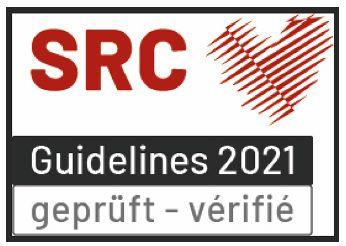Basic Training

BLS-AED-SRC Complete (Generic Provider)
The certificate is validated by the Swiss Resuscitation Council (SRC), and Swiss Defibrillator GmbH is an officially recognized and validated institution by the SRC, as listed on www.resuscitation.ch.
Learn life-saving skills for cardiac emergencies, including CPR and AED use for adults and children.
- Languages: Available in English, French, and German.
- Duration: 3–4 hours.
- Group Size & Price: Up to 8 participants, CHF 890.- (flat rate, excl. VAT).
Course Highlights:
- Recognizing cardiac arrest, heart attacks, strokes, and airway obstruction
- Performing high-quality CPR and AED defibrillation
- Placing an unconscious person in the recovery position
- Managing emergency scenarios with real-life simulations
- Understanding legal aspects and the chain of survival
Teaching Methods:
- Hands-on practice with AED trainers and mannequins
- Practical exercises and real-case scenarios
- Individual skills assessment and feedback
Who Can Attend?
- Healthcare professionals, first responders, and anyone needing certified BLS skills.
Certificate:
- Official BLS-AED-SRC Complet certificate, valid for 2 years.